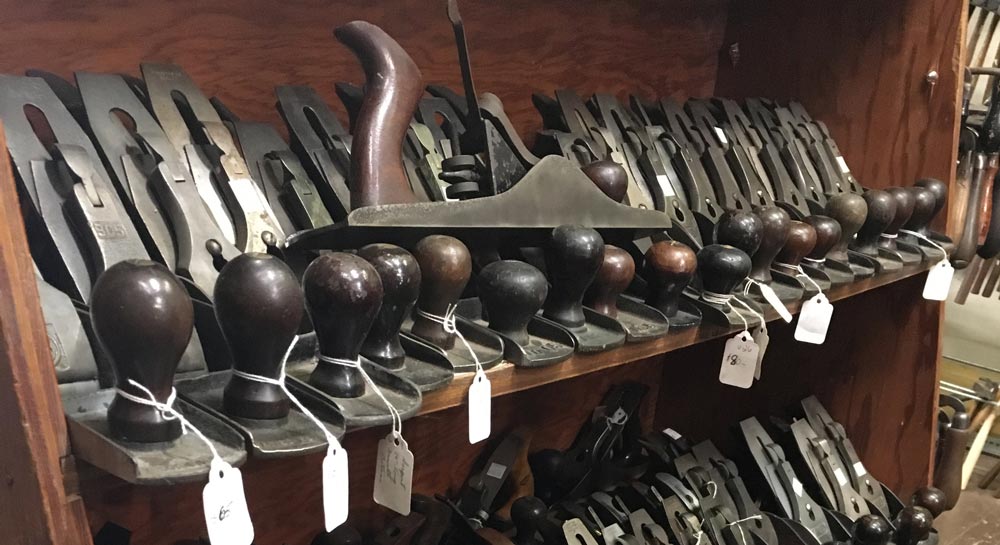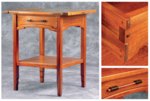We may receive a commission when you use our affiliate links. However, this does not impact our recommendations.
One of the personal agonies of writing this blog was dealing with tool reviews. I love my tools, and I adore the people who have made them for me. But I always struggled with the fact that tool reviews encouraged silly and unnecessary consumption.
Beginners are especially vulnerable. So if talk of tools makes you tingle, listen up.
Unless you run a woodworking school, you do not need four smoothing planes, six dovetail saws and 40 chisels. Having bunches of tools is like the difference between drinking a glass of water and drowning in a tsunami. You cannot possibly take care of six dovetail saws, and so they all get dull, you get frustrated and you probably buy a new one to compensate.
We all go through a phase where we think particular tools will make us a better woodworker. And somehow we think that having more tools will also do the same thing. It won’t. In fact, the opposite will occur.
As someone who wrote tool reviews for years, I think that practicing “tool monogamy” is always the best way to go. Buy one smoothing plane – a good one. Learn its peculiarities. All tools have peccadillos, and there is no easy way to learn how to deal with the ins and outs of 10 different versions of a tool.
If you do decide you need a “tool divorce,” then make it real. Sell the old one (or give it to an aspiring woodworker) and learn the peculiarities of your new tool. It’s far too easy to let your tool chest (and closet) fill up with tools you don’t like, need or want any more. Someone else would love to have your discarded tools.
Try to resist the urge to buy a tool on a whim – even I struggle with this on occasion. If you can give a tool a try before buying, there’s a much better chance that you’ll end up happy. At the very least, make sure you can return a tool if you don’t like it. Returning tools is a pain, but it’s better than suffering with something feels like an awkward rock in your hands.
On Collectors
There are exceptions to the above plea. If you are willing to admit in open court that you are a tool collector, then by all means gather as many tools as makes you happy. But know that a good collector is a steward of the tool and an inquisitor of its maker. Learn all you can about how each tool was made, who made them and what makes them different from others. Share this information with users (like myself) until we roll our eyes and begin to drool out the sides of our mouths.
Your information represents the heritage of both the tool-making industry and the craft. Share what you know at meeting of the Early American Industries Association and the Mid-West Tool Collectors Association.
Otherwise, if you just buy stuff and put it in a closet, you’re not a collector. You’re just a crow who likes shiny objects.
— Christopher Schwarz
Here are some supplies and tools we find essential in our everyday work around the shop. We may receive a commission from sales referred by our links; however, we have carefully selected these products for their usefulness and quality.










I’m in the middle of moving, and I’ve found another reason to appreciate your advice to only own as many tools as you can fit in your tool chest. Mine is a Dutch-style chest, so I can’t fit most of my moulding planes, but everything else — right down to my apron — fits. And that has made moving my shop a lot less stressful than it could have been. I don’t need to worry about whether this or that tool will wind up in the right place, I just heaved the chest into the back of my car and brought it to my short-term apartment. Once we have our new house, I’ll do the same to get it there.
It turns out there are a lot of good reasons to avoid buying too many tools!
Reading “The Fine Art of Cabinetmaking” was helpful to me. In it Krenov details the relatively economical set of tools and machines in his shop. It helped me see that less is more.
As far as hand tools, I think people often overbuy because they are using dull blades and don’t realize it. The think a different angle or size will make them better, when they really just need to get sharper.
I’ve bought a number of tools where I’ve later found (article/blog/video) a better, or just different, way to do the job that didn’t require buying the aforementioned tool, or there was a much better (and possibly less expensive) tool for the task. Yes, I regret buying some of the tools I bought–I spend a lot of time wishing I had known about X idea/technique/tool before I bought what I did. I am now trying to focus on using fewer tools to do things. There will come a time when I will no longer have a shop, but will want to continue being a maker, and I will need to pare down my tool catalogue to match my new space. And yes, I learned some of these things from you. Thank you.
At least I never bought more than two of the same tool.